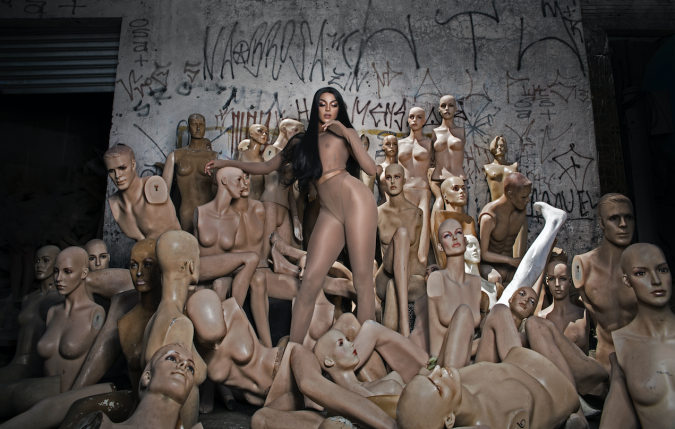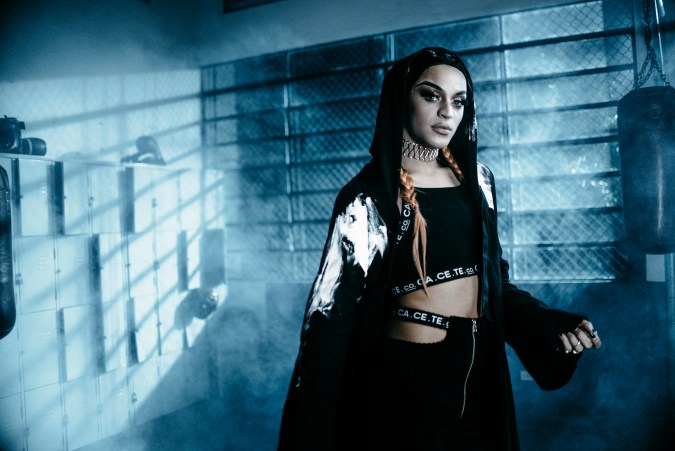Brazilian drag queen Pabllo Vittar started performing at 18, and only four years later, she’s bigger on YouTube than RuPaul herself. She’s been called “Major Lazer’s favorite drag queen,” and at 22, Vittar is on her way to a flourishing career, one that seems intent colliding Brazilian culture and sounds with gender play and traditions of queer performance.
That mission is exemplified in Vittar’s debut album Vai Passar Mal, released at the beginning of this year. After “Todo Dia,” a collaboration with queer Brazilian artist Rico Dasalam became the most popular song of the 2017 Carnaval, Vittar garnered an avid following. The lyrics, a rich proclamation of sexual liberation and celebration of, well, everyday hoeing, are sung over a Brazilian funk beat that begs to be twerked to. The song became so popular that its video, which features Dasalam and Vittar, surpassed the views for RuPaul’s “Sissy That Walk” on YouTube.

Originally from São Luis, Maranhão, Vittar started doing drag at 17 as a favor to a friend, who needed someone to pass out flyers for a show. From then on, Vittar immersed herself in the art form. In an interview with Remezcla, Vittar explains that writing and composing music came to her naturally, something she did in her head as she walked down the street. She sought a place to channel her creative energies, and ended up uploading covers and performances to YouTube.
“I am a daughter of RuPaul.”
Putting herself out there paid off when she was discovered by Bonde do Rolê producer Rodrigo Gorky, who invited her to record a demo. Each song on Vai Passar Mal is a deft exploration of Brazilian musical styles, from funk carioca to techno-brega to samba, often thrown in a blender with U.S. pop aesthetics. Vittar’s high-pitched yelps bounce over breakneck beats, conveying a sometimes dramatic but unperturbed call for living your best life. Pleasure, empowerment, heartbreak, and ass clapping are pretty common themes for debut pop albums, but Vittar’s punchy delivery and the eclectic but fiercely Brazilian production style set Vai Passar Mal apart.
“I love my country,” Vittar tells Remezcla, referencing her desire to fuse underground Brazilian street sounds with mainstream pop. “I will always try to take my culture to every corner in the world; I want everyone to know the culture I grew up in, [the culture] I fell in love with, because it’s not enough to love other cultures and step on our own.”
It was a natural choice for Vittar, who counted on the support of her family to help her develop her drag queen persona. While local media has positioned Vittar and RuPaul as competitors after “Todo Dia” outperformed “Sissy That Walk,” Vittar is a longtime RuPaul admirer; RuPaul’s Drag Race taught Vittar that drag is an art form, and inspired her to follow her own journey. “I am a daughter of RuPaul,” she says. “I always say this: the art of drag came to me as a way of exposing my inner feelings. I think the numbers I’ve gotten are a consequence of my work; I always try to get better and overcome my own limits.”
“I show people my truth and they relate to me.”
Like most aspiring singers, Vittar says Rihanna is also one of her biggest idols, but she also takes inspiration from contemporary female Brazilian pop stars, including Anitta, who collaborated with Vittar and Major Lazer on the recent “Sua Cara” from their Know No Better EP.
“I love Rihanna so much; she’s authentic and shows her power through her songs. I also like so many other sisters who are building [up] Brazilian pop music, like Lia Clark, Gloria Groove, Aretuza Lovi. I love my fabulous muse Anitta, who inspires me with the dedication she has towards her work. There’s also Frederico, who just launched his EP, and it’s wonderful.”

Vittar’s music videos are carefree and effervescent, and it’s impossible not to marvel at her fearless display of sexuality without celebrating it as a slap in the face of a heteronormative society, even though drag queens have a longstanding presence in Brazilian culture. Their history is fraught with erasure and lack of documentation, but drag performance in LGBT spaces made gender fluidity and queerness more visible in 1980s and 1990s Brazilian society. During the 1980s dictatorship, the military raided clubs in São Paulo where drag queens (or as they were called at the time, transformistas) and other LGBTQ people gathered. Even after the democracy was established, Brazil continues to be one of the most dangerous places in the world for queer and particularly gender non-conforming people.
Vittar’s queerness and drag performances challenge the homophobia that is deeply entrenched in Brazilian society, but Vittar sees her work as a simple exchange of experiences between her and her fans. “I show people my truth and they relate to me, so I am seen as a representative of the LGBT [community]. But I simply live what other people who relate to me live as well, so it’s an exchange of experiences, and together we create and learn every day with everything we go through and we support each other,” she explains. Vittar sees her use of both masculine and feminine pronouns as an important part of her personal identity, especially because she identifies as gay. “I don’t mind being called he or she; to me it’s natural – when I am in drag I identify as she, but I don’t mind either way. It’s important that I don’t pass as a trans person, because I am not, I am a gay boy and a drag queen, but this is a constant question from the media.”
Vittar’s recent remix of Major Lazer’s “Lean On,” which she renamed “Open Bar,” blends Brazilian samba and the original warped EDM vocal sample so well that Major Lazer approached her to collaborate. The result was “Sua Cara,” which was released on Major Lazer’s Know No Better and included Brazilian pop star Anitta. The music video, eagerly awaited by Vittar and Anitta’s fans, broke worldwide records with 2 million YouTube views within the first 40 minutes of release. “[The shoot] was incredible, it was so much fun, the weather was so hot, but all I could think about was how beautiful it looked and I wanted to do it for my VittarLovers,” she says. Even with Diplo’s history of cultural appropriation, the Major Lazer co-sign remains a coveted boost for artists looking to take their careers global.
Vittar’s lovably off-kilter vocals and her playful experimentation with U.S. pop and Brazilian sounds make Vai Passar Mal feel fresh for mainstream Brazilian pop. While this practice of hybridization isn’t necessarily new, Vittar’s deliberate collision of electronic beats with samba and funk, forró with pop, yields impossibly catchy songs. Vittar’s Major Lazer co-sign and the subsequent collaboration with Anitta will catapult her into a universe that will hopefully open the door for more queer artists and drag queens, especially Latin American and Latinx ones. The success of Pabllo Vittar – and her support for other drag queens like Lia Clark and Mulher Pepita – comes at a time where conservatives and homophobes in Brazil and are more emboldened than ever. That visibility and her success in pop culture remain a forceful challenge to an ever-regressing political sphere.





